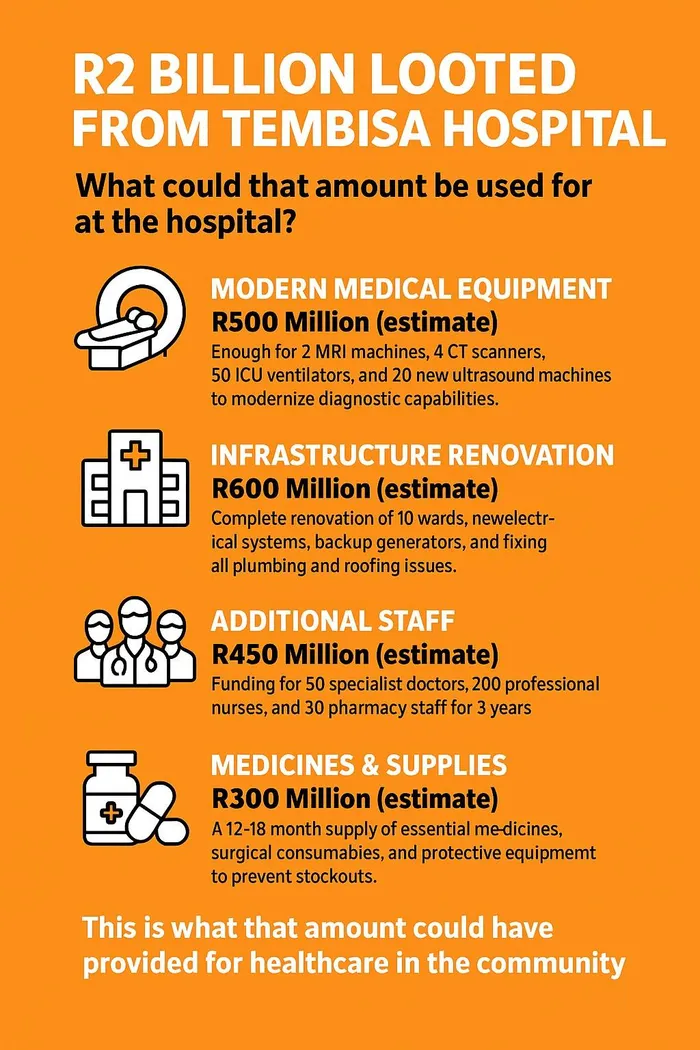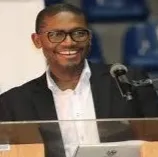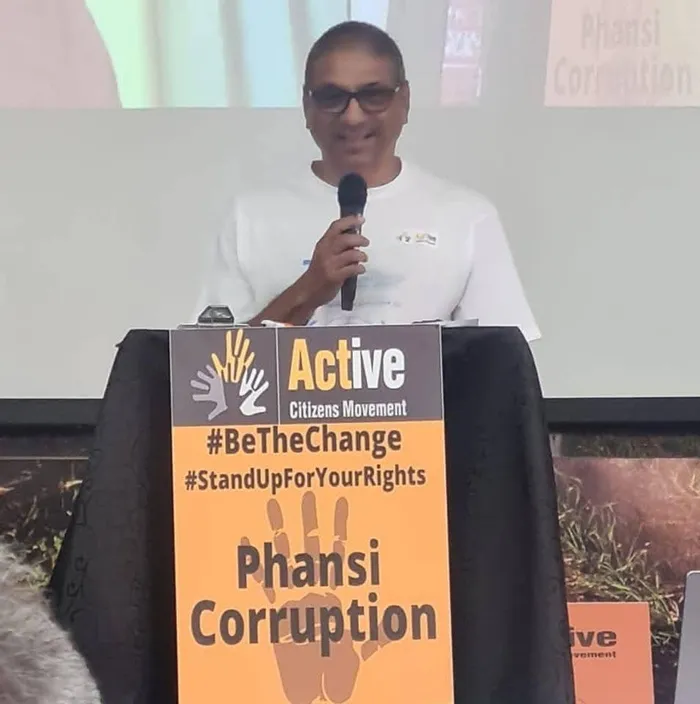The Tembisa Hospital looting: to honour Babita Deokaran, we must protect our whistleblowers
'Refuse to tolerate corruption'

The Active Citizens Movement compiled a cost estimation on what the R2.2 billion could have been used for.
Image: SUPPLIED
ADVOCATE TSELISO THIPANYANE
WHILE millions of South Africans face unemployment, hunger, and crumbling public services, billions of rands in public funds that could alleviate this suffering are lost to corruption.
This rampant looting proceeds with no regard for the misery left behind.
Our Constitutional Court has rightly pronounced corruption as a "cancer that threatens our constitutional order" and "a scourge that must be rooted out of society".
There is no starker recent example of this cancer's devastating effects than the Special Investigative Unit's (SIU) Interim Report on the Gauteng Department of Health and Tembisa Hospital.
The report reveals that over R2 billion meant for essential healthcare services was plundered by politically-connected criminal syndicates, aided by public officials who received over R122 million for their complicity.
As one judge noted, these are "greedy and politically connected officials within the public service whose past time is looting public funds".
While efforts are underway to recover some of these funds, the damage has been done.
This money could have upgraded dilapidated hospital infrastructure, hired and paid for healthcare workers, and purchased desperately-needed beds, ambulances, dialysis machines, and medicines.
Instead, it funded luxury vehicles, properties in up-market areas, and the lavish lifestyles of syndicate members and their political enablers.
The exposure of this grand theft is not solely the work of official investigators; it is primarily the heroic efforts of whistleblowers like Babita Deokaran, who paid with her life, and the tenacity of investigative journalists like News24's Jeff Wicks.
It was Wicks whose persistent reporting first uncovered the suspicious contracts at Tembisa Hospital, forcing the issue into the public eye and helping to trigger the formal SIU investigation.
One shudders to think how much longer the looting would have continued without their combined courage.
This very thought raises a terrifying question: how much ongoing corruption remains hidden because potential whistleblowers and journalists are too afraid to come forward?
The Tembisa case underscores the critical, interconnected roles of a protected whistleblower system and a robust free press in defending our democracy.
Tragically, most whistleblowers are not adequately protected. Like Babita, they are often victimised or even killed, with little support for their grieving families.
The perpetrators of the victimisation and murder are rarely held to account. Four years after Babita’s assassination, those who ordered her death still walk free.
The SIU's Interim Report should serve as a powerful catalyst for the government, particularly the Minister of Justice, to urgently reform the legal framework governing whistleblowers.
The Protected Disclosures Act of 2000 (PDA) is outdated and has repeatedly proven inadequate. Strengthening it is essential if we are to turn the tide against the corruption that threatens our constitutional democracy.
The SIU report exposes not only corruption but also a profound systemic failure.
The procurement process at Tembisa Hospital was hollowed out from within. Officials rubber-stamped fraudulent documents, the CEO authorised non-compliant bids, and transit clerks signed for goods that were never delivered.
The entire procurement chain was compromised and laid at the altar of the corrupt.
Worse still, when Babita raised the alarm, the system that should have protected her failed catastrophically.
Her shooters were caught, but the masterminds, those who gave the order and paid for her murder, remain free.
In the void left by systemic failure, many civil society organisations have had to step in.
The Active Citizens Movement (ACM) has been at the forefront of the fight for justice for Babita and for the protection of whistleblowers across South Africa.
A grassroots organisation committed to social justice, accountability, and active citizenship, the ACM has consistently advocated for legal and institutional reforms to protect those who expose corruption.
The ACM commemorated International Anti-Corruption Day in 2024 with the theme "Babita’s Long Walk For Justice".
The event was attended by the Head of the Hawks, Lieutenant-General Godfrey Lebeya, and SCOPA Chairperson Songezo Zibi.
Babita’s brother, Soorash, asked, "Why is it so difficult to find the mastermind when the killers have been found?". This question hangs over the entire investigation, a stark indictment of our justice system’s inability to protect its bravest citizens.
The ACM has also campaigned tirelessly for new legislation to protect whistleblowers to be enacted, but instead we repeatedly hear the rhetoric of lawmakers who praise the importance of whistleblowers without taking an action.
We believe that until those who expose corruption are properly protected, and until those who order killings are brought to book, the fight against corruption will remain incomplete.
To the extent that the executive and legislature continue to drag their feet and show no urgency in amending the PDA, they are complicit in betraying whistleblowers and the fight against corruption.
The SIU has made significant progress: 116 disciplinary referrals, 25 referrals to SAHPRA, 4 corruption cases sent to the NPA, and civil recovery processes underway. But this is only the beginning.
We call on the National Prosecuting Authority and the Hawks to accelerate the investigation into Babita’s murder and to follow the evidence where it leads, no matter how high it goes. The SIU report has named names and traced money flows. There can be no more excuses for delay.
We also call on the government to actively create a culture where integrity is rewarded, not punished.
Public servants like Babita should be celebrated, not silenced.
The current legal framework is a deterrent to truth-tellers, and its overhaul is a non-negotiable step towards a more ethical state.
Government must proactively prevent corruption through stronger controls, transparent procurement, and real-time monitoring.
Consequence management is vital, officials who enable corruption must face swift discipline, dismissal, or prosecution to ensure accountability and deter future abuse of public funds.
The SIU's report on Tembisa Hospital exposes the devastating impact of corruption, but it also demonstrates how the combined efforts of whistleblowers and investigative bodies can fight back. These joint efforts are commendable and must be supported.
However, the commendable work of the SIU will be overshadowed as long as those behind Babita's killing remain at large.
Any further delay in finding and prosecuting those responsible for her death is a blot on our government’s ability to protect our democracy and raises serious questions about its commitment to fighting corruption.
In light of the SIU's revelations, we reiterate our call for the government to speed up reforms for better whistleblower protection.
We also call on bodies like the South African Human Rights Commission and the Public Protector to fulfil their mandates by doing more to protect and support whistleblowers.
As one judge powerfully stated, whistleblowers are "patriotic individuals who are now the face of our new struggle", a struggle against a system of corruption described as "more evil than the apartheid system".
It is a struggle we cannot afford to lose.
Finally, we call on every South African to honour Babita’s legacy by refusing to tolerate corruption. Support whistleblowers in your communities and workplaces. Demand accountability from those in power. Use your vote to support integrity and clean governance.

ADVOCATE TSELISO THIPANYANE
Image: SUPPLIED

Pops Rampersad
Image: File
Tseliso Thipanyane and Pops Rampersad are members of the ACM. The civil society organisation comprises volunteers who are involved in anti-corruption programmes, whistleblower support and protection, and the promotion of the Constitution and democratic values.